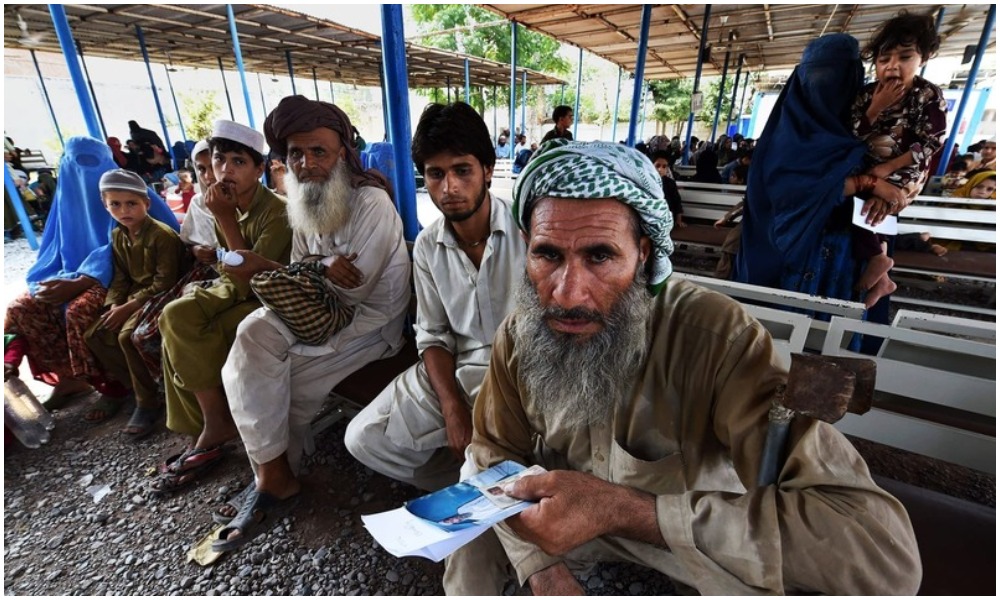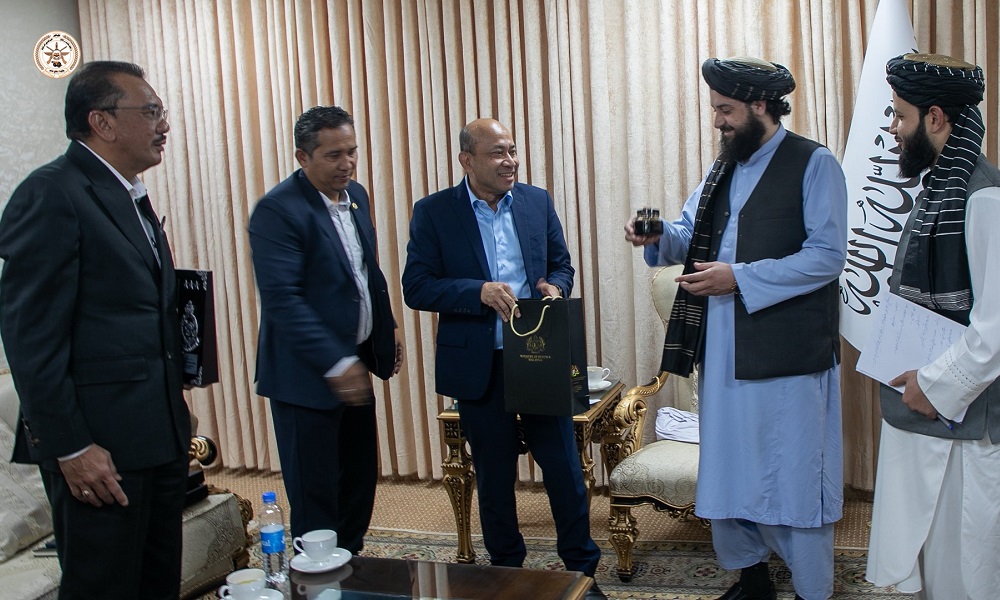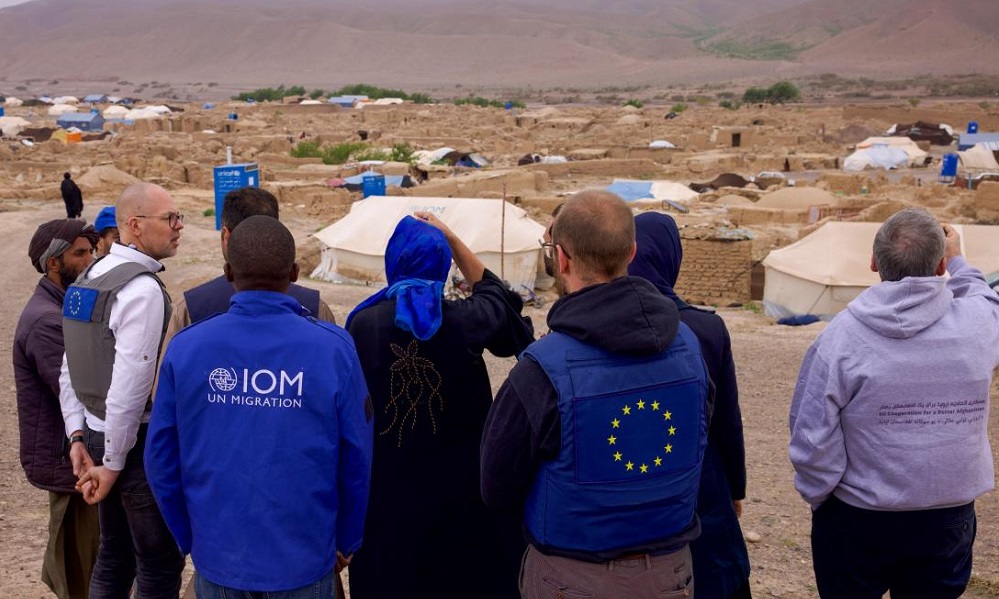Latest News
Pakistan to issue smart cards to over 1.4 million Afghan refugees

The Government of Pakistan, with the support of UNHCR, has launched a nationwide verification exercise for 1.4 million Afghan refugees during which new smartcards will be issued.
The Documentation Renewal and Information Verification Exercise, or DRIVE for short, was inaugurated at a ribbon-cutting ceremony in Islamabad by the Federal Minister for SAFRON, His Excellency Mehboob Sultan. The UNHCR Representative, Noriko Yoshida, and the Chief Commissioner for Afghan Refugees, Saleem Khan, were also present on the occasion.
During the six-month exercise, registered Afghan refugees who currently hold Proof of Registration (POR) cards will be provided with new smart cards.
“The DRIVE exercise is a leap forward for everyone,” Yoshida said, welcoming its launch. “This step will allow refugees to have better, faster, and safer access to services, including schools, hospitals, and banks.”
Yoshida added that in addition to verifying existing data, the exercise will record Afghan refugees’ skill sets, level of education, socio-economic circumstances, allowing better-targeted health, education, and livelihood support in Pakistan and Afghanistan.
“Pakistan has been hosting Afghan refugees for four decades, and a lot has changed since the last verification exercise 10 years ago. It’s crucial that we update the data of Afghan refugees to understand their situation better,” said the Federal Minister for SAFRON.
Sultan added, “As the country hosting one of the most protracted refugee situations in the world, Pakistan has strived to play its part in assisting and protecting refugees. It’s important the international community also continue to come forward, and share the responsibility and help find solutions.”
The Federal Minister for SAFRON urged POR cardholders to participate fully in this exercise. He also requested that they take all precautionary measures and observe COVID-19 protocols.
Six hundred male and female staff – a combination of government and UNHCR – will be working at some 35 DRIVE verification sites around the country, and using mobile registration vehicles, to support refugees throughout the exercise.
Measures are in place at all DRIVE sites to mitigate COVID-19 risks through enhanced hygiene, physical distancing, and the scheduling of set numbers of appointments each day.
Latest News
Tripartite trade meeting held in Kabul to boost regional connectivity

A tripartite meeting between the delegations of Afghanistan, Turkmenistan and Kazakhstan was held in Kabul with the aim of connecting North Asia to South Asia and reducing transit and transportation costs among these three countries, the Ministry of Trade and Commerce said in a statement.
In this meeting, an agreement was reached on the creation of a joint technical committee to continue the talks.
This tripartite meeting was held under the leadership of Nooruddin Azizi, the Acting Minister of Industry and Commerce, Vice President of Turkmenistan and Srik Zhumangarin, the Deputy Prime Minister of Kazakhstan.
Earlier, a bilateral meeting was held between the delegation of the Islamic Emirate and Turkmenistan. The ministry of commerce said the participants of the meeting discussed the construction of a large joint logistics center in Torghondi, the trilateral transit agreement between the IEA, Turkmenistan, and Kazakhstan, the expansion of Afghanistan’s railway, solving issues related to Afghan transit and export goods, and a number of other commercial issues.
Latest News
No destructive groups including Daesh present in Afghanistan: Yaqub Mujahid

Acting Minister of National Defense Mohammad Yaqub Mujahid has said that no destructive groups including Daesh have physical presence in Afghanistan, adding the Islamic Emirate of Afghanistan (IEA) will not allow anyone to pose threat to any country in the region from the Afghan soil.
Mujahid made the remarks in a meeting with a delegation from Malaysia in Kabul on Thursday.
According to a statement released by the Ministry of Defense, Mujahid highlighted Malaysia’s “good treatment” of Afghan refugees and its long-standing relations with Afghanistan, and said that Malaysia is a powerful Islamic country and visits should increase.
He added that with the establishment of the Islamic Emirate, occupation and war ended in Afghanistan, and the country is fully secure.
Based on the statement, the Malaysian delegation called Afghanistan a friendly country and while emphasizing on comprehensive cooperation, it assured that what they have seen in Afghanistan will be shared with the authorities of their country.
Latest News
EU allocates 17 million euros to support Afghans on the move

The European Union signed an agreement worth 17 million euros with the International Organization for Migration (IOM) to improve access to basic services, increased economic opportunities and protection for Afghans on the move and their host communities in Afghanistan.
The needs of women and girls are a particular focus of the programme, EU said in a statement released on Thursday.
The statement noted that from January 2023 until April 2024, over 1.5 million Afghans returned from Pakistan and Iran.
“I am deeply moved by the hardship returnees face when being deported to Afghanistan. In a country suffering from poverty and climate change, and in a city that just saw devastating earthquakes, this truly is a crisis within a crisis.”, said Peteris Ustubs, Director for the Middle East, Asia and Pacific of the European Commission’s Department for International Partnerships during the signing ceremony at the IOM transit centre in Herat.
Raffaella Iodice, EU Chargée d’Affaires a.i. to Afghanistan, added “The solidarity of the Afghan people towards their brothers and sisters is an inspiration. We must assure that communities hosting and helping new arrivals are supported. The partnership with IOM ensures access to essential services and provides protection for Afghan returnees and their host communities. As women and girls can be particularly affected, we make sure that all members of society can benefit”.
“IOM’s continued partnership with the EU has been critical in enabling our teams to reach hundreds of thousands of Afghan returnees and other vulnerable communities in the country”, said IOM Afghanistan Chief of Mission, Maria Moita. “Thanks to this renewed commitment, we will be able to focus on addressing the immense challenges in the areas of return and contribute to reintegration, social cohesion, and longer-term solutions for those communities.”
This additional contribution is part of a 5-year programme that is being implemented across Afghanistan and in four countries in the region. It builds on the EU’s previous support to IOM to improve the wellbeing of Afghans forced to return to the country, EU said.
-

 Latest News4 days ago
Latest News4 days agoRashid Khan named AWCC’s brand ambassador
-

 Regional5 days ago
Regional5 days agoIranian president lands in Pakistan for three-day visit to mend ties
-

 Sport5 days ago
Sport5 days agoKolkata beat Bengaluru by one run in IPL as Kohli fumes at dismissal
-

 Sport5 days ago
Sport5 days agoACL: Aino Mina 3-0 Istiqlal Kabul; Attack Energy 3-0 Khadim
-

 Climate Change5 days ago
Climate Change5 days agoRescuers race to reach those trapped by floods in China’s Guangdong
-

 World4 days ago
World4 days agoMalaysian navy helicopters collide in mid-air, 10 killed
-

 Sport4 days ago
Sport4 days agoJaiswal ton powers Rajasthan to big IPL win
-

 World3 days ago
World3 days agoNorth Korea officials visit Iran in a rare public trip
























